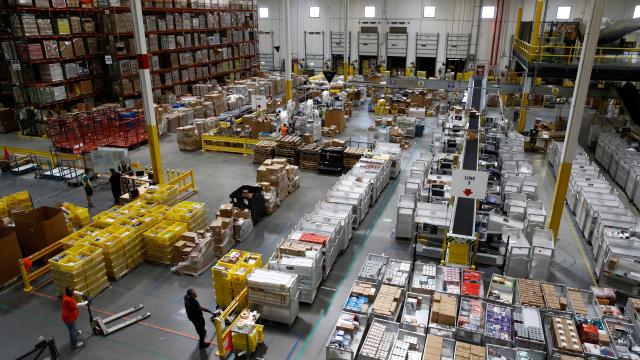E-commerce giant Amazon has long been reported to be an unpleasant place to hold down a job. Article after article has relayed claims of an ultra-competitive workplace culture, employees being treated like soulless robots, sweatshop-esque performance requirements, and long hours of monotonous work.
That includes mandatory seasonal overtime that some workers have said sometimes results in injuries.
Here’s an unflinching look at what those labour conditions have meant for some members of the richest man in the world’s workforce: From October 2013 to October 2018, authorities responded to emergencies calls at least 189 times for “suicide attempts, suicidal thoughts, and other mental-health episodes” at Amazon warehouses, according to a Monday report by the Daily Beast.
That’s just the ones that were found, the report noted, with the 46 warehouses in 17 states where the calls were placed accounting for “roughly a quarter of the sorting and fulfillment centres that comprise the company’s U.S. network.” (Other locations either did not have any such calls listed or records were unavailable, the Beast wrote.)
Some of the calls involved individuals who were upset about matters unrelated to their work at Amazon, while others involved individuals not employed or contracted to work at the facilities. And while the Beast report noted it did not have any evidence that Amazon staff had more workplace mental health crises necessitating intervention than those at other companies, it did find that many of the incidents appear to have been related to work conditions.
EXCLUSIVE: Shocking 911 calls from inside Amazon warehouses reveal suicidal threats by employees https://t.co/Z1dHz7Trd8 pic.twitter.com/aQtOTRRGjS
— The Daily Beast (@thedailybeast) March 11, 2019
One former Amazon warehouse worker in Etna, Ohio who manned an inventory-counting station for $21 an hour, Nick Veasley, said he had to process hundreds of items an hour and described managers so focused on metrics that workers were afraid to talk to one another, lest they be accosted for an unauthorised break.
He told the Beast that standing on his feet all day was correlated to worsening ankle pain that eventually required surgery, and when he returned to work after a two-month break, he was disciplined for taking bathroom breaks necessary to manage his irritable bowel syndrome and diverticulitis:
He received two write-ups and was told that another violation could result in suspension or termination, he said. (Amazon called his account “highly unlikely,” saying managers work with HR to have a thorough conversation about “barriers” that lead associates to “accrue time off task.”)
“Usually I can get myself out of a problem but I couldn’t do it working at Amazon,” Veasley said. “I felt like I had a thousand pounds wrapped around my ankle and it kept dragging me down and down and down, and there was no way out.”
Eventually, after Veasley told a guard at the facility he wanted to drive his car off a cliff, Amazon summoned police and he was placed under a three-day hold at a psychiatric ward.
“That place screwed me up so much it put me into a depression where I was actually on a 72-hour hold in a psych ward,” Veasley told the Beast.
Six current or former Amazon employees who had undergone mental health crises “that required emergency assistance at the warehouse” told the Beast that unrelenting work demands at Amazon contributed to the situation. One said that managers would blame workers for failing to meet quotas even when they were impossible to complete, while former Lakeland, Florida warehouse employee Jace Crouch described the environment as an “isolating colony of hell where people having breakdowns is a regular occurrence.”
The Beast report also noted that intervention by emergency personnel was not the end of the indignities faced by the Amazon workers, with several telling the site they had difficulties obtaining compensation or receiving treatment:
Of the six current or former Amazon workers who spoke to The Daily Beast, five were put on leave from work. They said they struggled to obtain promised compensation, found counseling was insufficient or unaffordable, and in some cases they were fired.
After being removed from Amazon by emergency responders — a situation some found humiliating — workers were often put on short-term medical or disability leave, entitling them to 60 per cent of their pay and a return to their job after psychiatric clearance… While on leave, some workers used the company’s employee assistance program, which includes three phone conversations with a counselor, and also sought outside psychiatric help. Even with Amazon-provided health insurance, the costs were often a financial strain.
Amazon denied the allegations in the report, telling the Beast in a statement that the number of calls lodged at its warehouses was an “overgeneralisation” which “doesn’t take into account the total of our associate population, hours worked, or our growing network.”
“The physical and mental well-being of our associates is our top priority, and we are proud of both our efforts and overall success in this area,” Amazon told the site.
“We provide comprehensive medical care starting on day one so employees have access to the care when they need it most, 24-hour a day free and confidential counseling services, and various leave and medical accommodation options covering both mental and physical health concerns.”
If depression is affecting you or someone you know, call Lifeline on 13 11 14.
